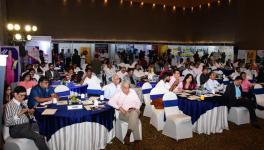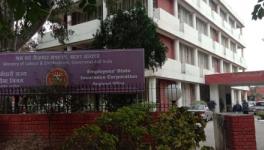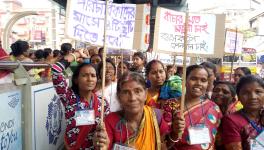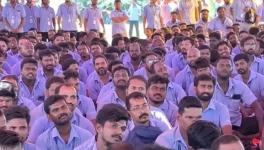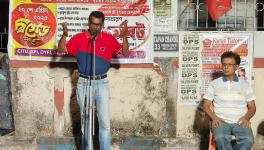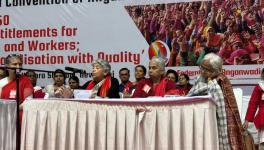Bengal: Centre’s Aadhaar-Based KYC Directive Puts Anganwadi Meals at Risk
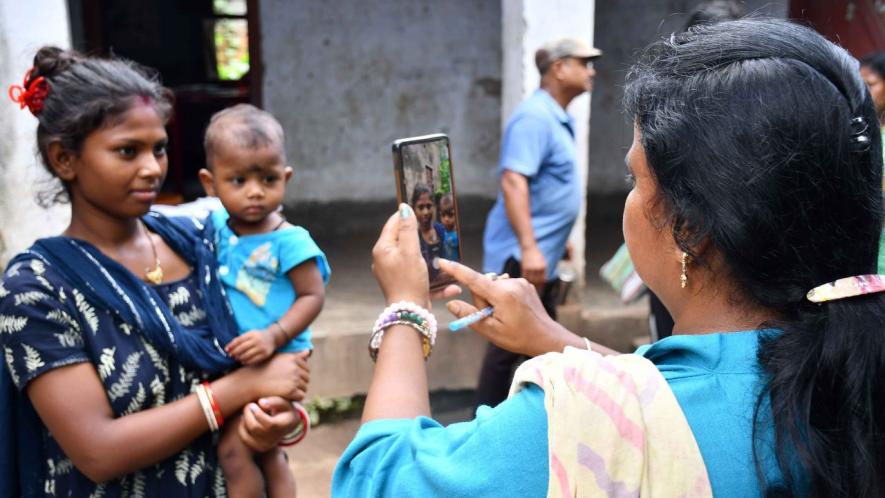
An anganwadi worker taking a photo of a mother named Sikha Sahis, whose photo did not match with her Aadhaar card.
Uncertainty surrounds the availability of meals for children at Anganwadi centres in West Bengal following a recent directive from the Union Ministry of Women and Child Development. The directive mandates that children will only receive hot, cooked meals at Integrated Child Development Services (ICDS) centres after a photograph of their mother is matched with her Aadhaar card. This Aadhaar-based verification process is now being treated as the child’s KYC (Know Your Customer). The West Bengal government has accepted this directive without objection, and Anganwadi workers across the state have begun photographing mothers at the centres.
However, in many cases, the newly captured photographs do not match the images on the Aadhaar cards. As a result, confusion and anxiety have spread among Anganwadi workers, helpers, and the parents of enrolled children. Due to this directive, a significant number of mothers are unable to complete the KYC process, leading to concerns about whether their children will be denied meals.
In response, the Paschimbanga Rajya ICDS Karmi Samity, affiliated with the Centre of Indian Trade Unions (CITU), has launched an agitation demanding the immediate withdrawal of the directive. On June 30, memoranda were submitted to all District Magistrates and relevant Project Officers across West Bengal.
On Wednesday, July 2, the organisation held a large gathering in the Salt Lake area of Kolkata and submitted a memo to the Minister of Women and Child Welfare of West Bengal Shashi Panja and the director of the department, Rachana Bhakot. Under pressure of the movement, the state government was compelled to respond. Director Bhakot informed the leadership of the Paschimbanga ICDS Karmi Samity that the state government had sent a formal letter to the Union Ministry opposing the directive.
Despite this assurance, Anganwadi workers continued photographing mothers on July 3 for the purpose of Aadhaar verification, submitting the images through the Poshan Tracker App — the centralised platform used for monitoring and data collection in ICDS centres.
Indrani Mukherjee, working president of the state committee of the Paschimbanga ICDS Karmi Samity, confirmed that the process was still ongoing, even though the state government had expressed its opposition.
A protest rally in Bankura at the call of Poshchimbanga IGDS Kormi Samity against the directive to provide KYC to children at Anganwadi centers.
The new directive was issued by Deputy Secretary Jyotika of the Union Ministry of Women and Child Development on June 30, addressed to the Additional Chief Secretaries, Principal Secretaries, and Secretaries of Women and Child Development or Social Welfare departments of all states. It instructs that all Take Home Ration (THR) deliveries must be conducted through the Fresh Recognised System (FRS) and that the attendance of children attending Anganwadi centres must be recorded and linked with FRS at the time of registration.
According to this directive, no child will receive cooked meals from ICDS centres unless their photograph, along with their mother’s photograph, is matched with the Aadhaar database, and all related information is uploaded through the Poshan Tracker App. This new regulation officially came into effect on July 1.
It is important to note that the Anganwadi project was launched in 1975 by the Union government under the ICDS scheme to fight hunger and malnutrition among children aged six months to six years, as well as pregnant and lactating women. Currently, there are over 13.63 lakh Anganwadi centres across India serving millions of beneficiaries, primarily from economically weaker and marginalised communities. These centres also provide pre-primary education and nutritional support to children.
However, the scheme faces chronic underfunding. The budget allocation for food is minimal and often delayed, forcing workers and helpers to borrow money to continue meal preparation. Despite receiving extremely low wages, Anganwadi workers and helpers continue to serve children and mothers with utmost dedication and care.
Now, the Aadhaar-based KYC requirement has introduced new challenges on the ground.
Sagarika Ghosh, an ICDS worker from Bishnupur, told this reporter that when children were initially registered, their mothers’ Aadhaar details were already submitted. However, many mothers now look different from the photos on their Aadhaar cards, often because the cards were made before their marriage.
Other workers, including Kakali Mandal from Kenduadihi Shikhoriyapara and Pampa Lohar from Lokpur ChameriBosti, reported the same issue. In many cases, the mobile number linked to the Aadhaar card is no longer in use, as families have stopped maintaining mobile phones due to the increasing cost of recharge. This creates a serious obstacle when an OTP (One-Time Password) is sent to the outdated number during the verification process via the Poshan Tracker App. If the SIM is no longer active or has changed ownership, the OTP cannot be received, and the child’s KYC remains incomplete. As a result, these children risk being denied meals.
Children are eating cooked hot food at anAnganwadi centre in Kenduadihi, Bankura.
Usha Mahato, an Anganwadi worker from Ranibandh in the Jangalmahal area, shared her experience of how this technical hurdle was affecting the registration process.
Indrani Mukherjee stated that on June 30, they had submitted memos to the District Magistrates and Project Officers across all districts in West Bengal, but none could provide a solution. Therefore, they proceeded to Kolkata on July 2 and staged a large protest rally from Karunamoyee in Salt Lake. The police initially set up barricades to prevent the protesters from advancing, but thousands of Anganwadi workers and helpers pushed through, forcing the police to remove the barriers. The workers have made it clear that under no circumstances will they stop feeding children. Their protest movement will continue until the directive is withdrawn.
This situation has exposed the disconnect between policy decisions made at the Central level and the complex ground realities faced by marginalised communities. While the directive may have been introduced to improve transparency and accountability, its rigid implementation without adequate infrastructure and field-level feasibility has sparked a crisis that could deny basic nutrition to children who need it the most.
(Pics by Madhu Sudan Chatterjee)
The writer works for ‘Ganashakti’ newspaper in West Bengal.
Get the latest reports & analysis with people's perspective on Protests, movements & deep analytical videos, discussions of the current affairs in your Telegram app. Subscribe to NewsClick's Telegram channel & get Real-Time updates on stories, as they get published on our website.









